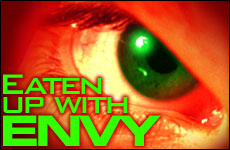 An Open Letter to University Presidents
An Open Letter to University Presidents


5 min read
God didn't forget about you. If you were meant to have that home, spouse, career -- you'd have it.
My kids have a book "The Berenstain Bears and the Green-Eyed Monster" in which the young bear cubs confront their tendency towards jealousy.
No question about it. Jealously is one ugly, destructive creature who's more than willing to devour us if we're not careful. It's a creature that requires constant vigilance and battle. A creature so pervasive and damaging that it is the only emotion to get star billing in the Ten Commandments. (The Berenstain Bears don't mention that part).
Envy is so distorting, so lacking in perspective and judgment, our sages warn us that jealousy is one of the negative traits that take us out of the world (Ethics of the Fathers, 4:28). (The Berenstain Bears don't cite that reference either.)
What do we envy? You name it. Other people's spouses -- she's thinner, a better cook, a more competent mother. He's more successful, kinder, a more involved father. We envy other people's children. Their jobs. Their talents. The honor accorded them. And sometimes, if we're lucky, we envy other people's virtues.
Unfortunately it's only in the areas where there are real relationships to damage that we experience genuine jealousy.
Who do we envy? Although every other magazine profiles the lives of the rich and famous -- the Hollywood stars, the movie moguls, perhaps some powerful business executives, I don't think that really excites our jealousy. We can't imagine living like that. It's like a peasant who sees a princess; he wouldn't even desire her for his wife because she is completely out of reach.
We most often envy our friends. Why did their son get the solo in school choir and mine didn't? Why did her husband get a promotion and not mine? How does she manage to look so put-together and I don't? Unfortunately it's only in the areas where there are real relationships to damage that we experience genuine jealousy.
Instead of promoting closeness and unity, envy leads to animosity and distance. It frequently leads to lashon hara (malicious slander). Since we begrudge them their good, we end up disparaging them. It could even lead to acts of violence.
And why? Did they take something from you? Is there a finite amount of good in the world? It's not like the Almighty has a giant chocolate cake and erred in determining how large to cut each piece. "Sorry only crumbs for you."
The Almighty gives each of us exactly what's appropriate. If we were meant to have that home, spouse, child, career -- we'd have it. He didn't forget about us. And we won't get more by stomping our feet, crying and throwing a tantrum.
Our challenge is to make the most of what we have; to realize that the Almighty gives us what we need, and that we need what He gives us. Out goal is to best play the cards we've been dealt. There are poor people who spend every cent strategically and give charity thoughtfully and there are wealthy people who squander their resources and miss the opportunity to help others. The achievement is in the doing not the having.
Sounds very nice, but how do we battle that instinctive, visceral, negative reaction we may have when we hear about the new good awarded a friend? Marriage, children, the "right" schools, "perfect" grandchildren?
Begin by giving. Give to the person we are jealous of. Since giving always deepens caring, it will change our focus. We will think more about their good and it will be easier to wish them success.
Think about our attitude towards our children. Since we love them we only want their good. If they're smarter than us, more attractive, more accomplished, not only are we not jealous, we're thrilled. We need to transfer that attitude to our friends and acquaintances.
Count our blessings. Hard to do when feeling put upon and grumpy, but crucial nevertheless. We are not hurt in any way by the good the Almighty has given others, only by our attitude towards it.
The Torah recognizes one positive use of jealousy - be envious of the virtues in others.
When we see our children jealous of each other, we find it both disturbing and silly; disturbing that they should be experiencing that pain, and silly because we know how much love we have to go around and the and special feelings we have for each of them. We also know that we don't always give them all exactly the same thing at the same time because that's not what they need.
When the Almighty looks down and sees His children consumed with envy, He feels just as we do. It's silly, it's disturbing, there's plenty of love to go around and every one gets what they particularly need.
The Torah recognizes one positive use of jealousy - be envious of the virtues in others. This is an area where we can make changes and use envy to spur us on to greater character growth. We can strive to emulate the exemplary actions and strengths of our friends.
Every time we feel jealous, let's think of some small way we can grow. Then we'll be so busy that the green-eyed monster will slink away in disgrace, searching for more fertile territory. Don't let him take up residence in yours.
